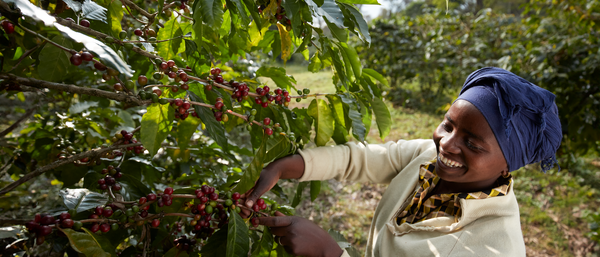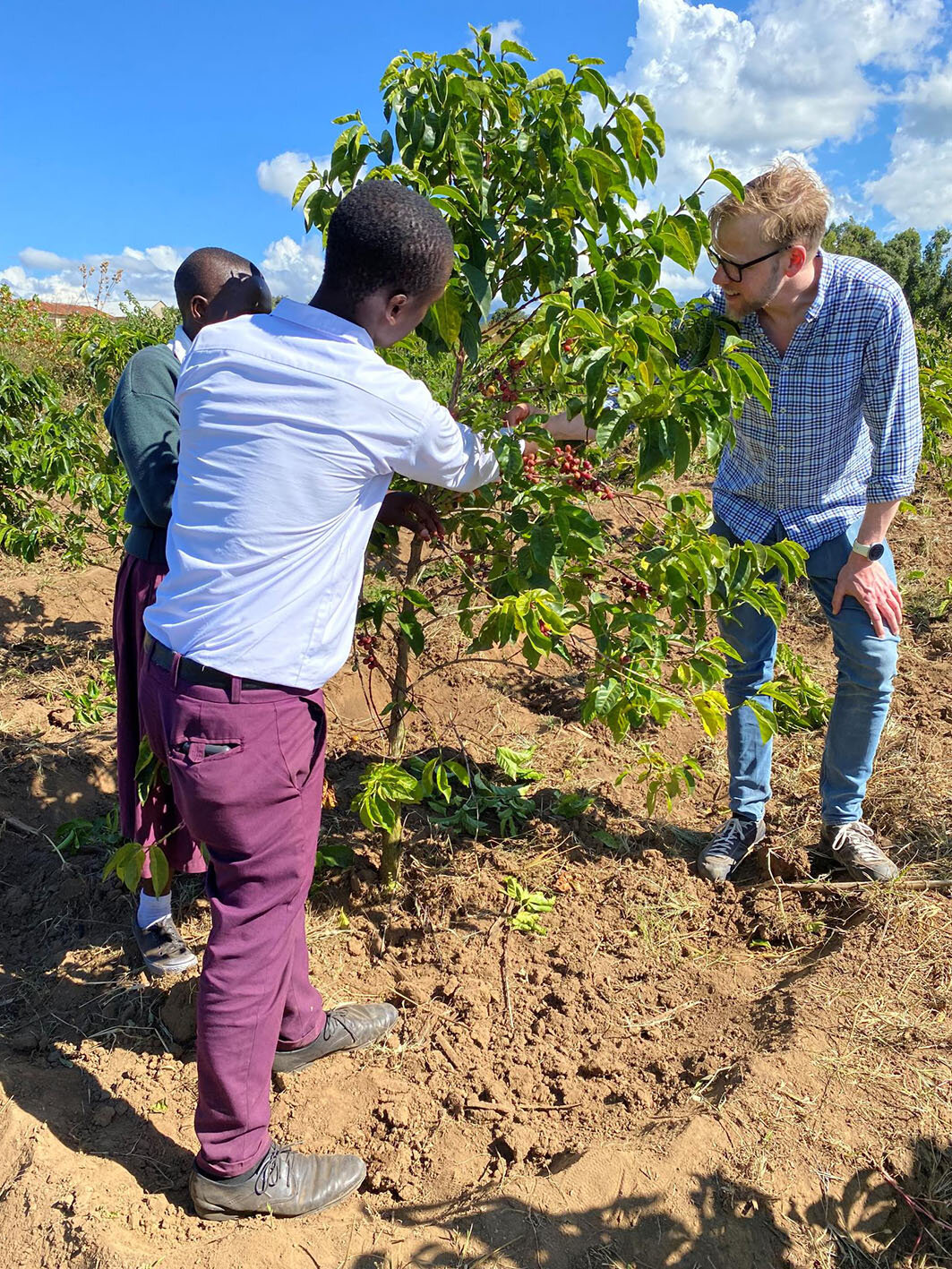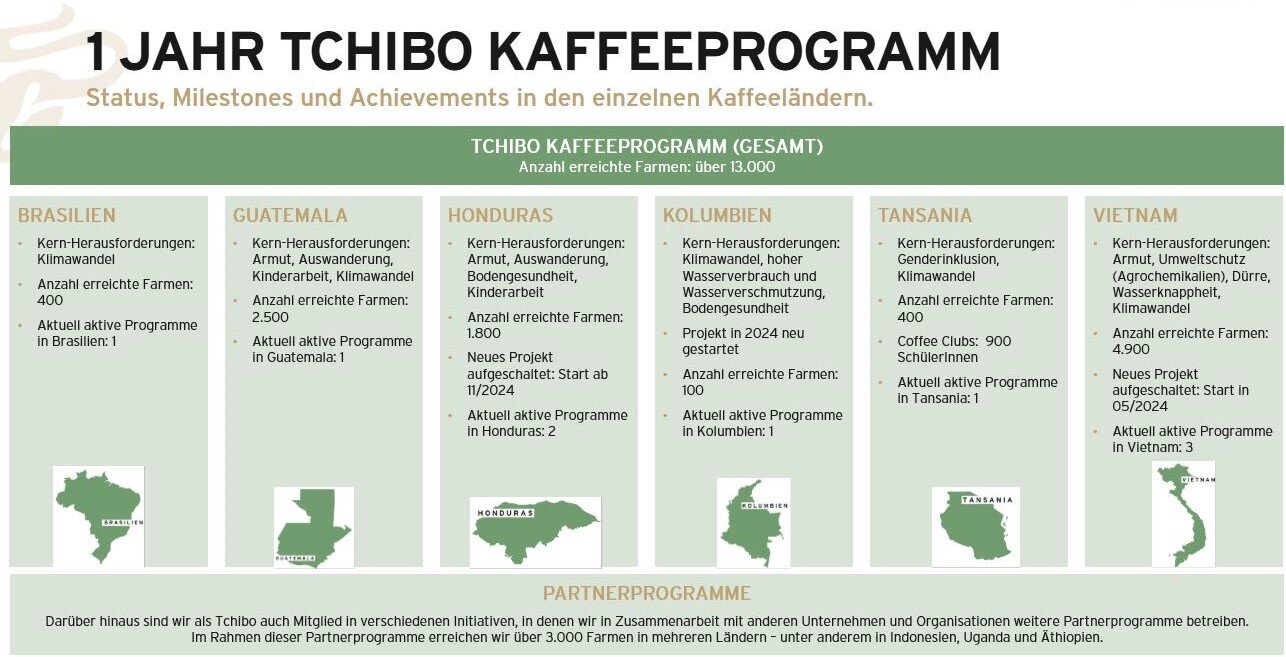
Tchibo coffee programme off to a successful start: One year later, 13,000+ farms in nine countries reached
Hamburg,
In February 2024, Tchibo clearly communicated its goal: to offer only responsibly sourced coffees by 2027. A good year later, the Hamburg-based family business is pleased with the initial milestones that have been reached.
“Our Tchibo Coffee Programme is a way to effect positive change in coffee farming, both in terms of improving low farm incomes and in combating the effects of climate change,” explains Pablo von Waldenfels, Director Corporate Responsibility at Tchibo. Since its launch, the programme has reached more than 13,000 farms across nine countries: Brazil, Guatemala, Honduras, Colombia, Tanzania, Vietnam, Ethiopia, Uganda, and Indonesia. Already, a good 20 per cent of the raw coffee used by Tchibo is responsibly sourced. And the trend is steeply upward. “This makes us confident and shows that we are fully on track to achieve our goal,” von Waldenfels is happy to note.
The Tchibo Coffee Programme involves developing programmes specifically tailored to local requirements – and always hand in hand with the farmers and strong partners such as International Coffee Partners (ICP) or the organisations behind the certification seals. “This way, we will ensure that by 2027, all coffee purchased by Tchibo will come from regions where continuous efforts are being made to improve environmentally and socially responsible farming practices so as to significantly improve the livelihoods and living conditions of farmers,” says von Waldenfels.

“Locals need more support in putting sustainable farming methods into practice. Which is why we’re expanding our coffee programme”, continues von Waldenfels. It already includes training in agroforestry, i.e. the planting of shade trees and the complementary cultivation of other crops to secure farm income, and soon will also comprise the sowing of new coffee varieties that are less vulnerable to the effects of climate change. The programme is being implemented in close co-operation with local trainers and agronomists. Information on the programme will be displayed on our products from now on, replacing the current communication of the certification seals.
Tchibo coffee programme is closely monitored by the certification partners independently of the certifications. The independent non-profit organisation Enveritas monitors and verifies the effectiveness of the measures.
Custom-tailored: Every country gets its own bespoke programme
The specific measures are coordinated regionally to achieve the greatest possible impact. In Brazil, for example, the focus is on protecting biodiversity, the climate, and water, while in Honduras the main focus is on fighting poverty. This means that each country receives a custom-tailored programme.

“If we still want to be drinking coffee in 20 years’ time despite climate change, then NOW is the time to start tackling the issue. And that is exactly what we’re doing with our Tchibo coffee programme. ‘Coffee to stay’ isn’t just our in-house mission statement, but also our vision for the entire coffee sector: We want coffee to be here to stay, and to continue to be available to everyone in the future”, explains von Waldenfels.
More information for journalists:
Arnd Liedtke, Director Corporate Communications
Phone: +49 40 6387-2876
E-Mail: arnd.liedtke@tchibo.de
About Tchibo:
Tchibo represents a unique business model. In eight countries, Tchibo operates around 900 shops, over 24,200 retail depots, and national online stores. Through its multichannel distribution system, Tchibo offers not only coffee and single-serve systems Cafissimo and Qbo, but also a weekly changing range of non-food products and services. Founded in Hamburg in 1949, the family-owned company achieved a revenue of 3.2 billion euros in 2023 with 10,708 employees internationally. Tchibo is the market leader in roasted coffee in Germany, Austria, Czech Republic, and Hungary and is among the leading e-commerce companies in Europe. Tchibo has been repeatedly recognized for its sustainable business practices.